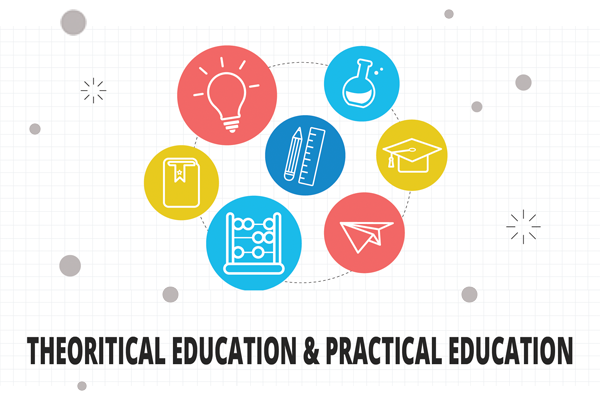
“Knowledge is power. Information is liberating. Education is the premise of progress, in every society, in every family.”
—Kofi Annan
Education is the basic right of every human in this world. Education empowers us. It is what differentiates between a human and an animal. Education teaches us moral values and gives us knowledge on topics that is otherwise unknown to human.
It enables us to interact with each other and our environment in a civilized manner. An educated person can differentiate between what is right and what is wrong. Education determines the success of a society.
Hence, a society with a large number of educated people means that this society is more likely to be successful, civil, and modern. Education is not just the theory that we learn from our books or in classrooms. We can also get education from practical experiences that take place outside our typical classrooms.
Two Main Categories of Education
Education is mainly divided into two main categories. These two categories are practical education and theoretical education. Both, theoretical and practical education have their importance and value in a person’s life.
But if a person is to choose between the two, towards which one should he or she be more inclined to, practical education or theoretical education? Both are somewhat equally important as on hand we have the theoretical knowledge of a subject, whereas, on the other hand, we have practical examples and learning of the same subject.
Now, the question is, what exactly theoretical and practical education is?
Theoretical Knowledge
Theoretical Education refers to the fact and figures of a particular subject. All that you study from a textbook, journal, article, blog, or any other source is called theoretical education or theoretical knowledge. Theoretical knowledge or theoretical education is of great importance. With the assistance of theoretical knowledge, you can get the know-how of how anything works or why something is the way it is.
Theoretical knowledge is the knowledge of other people on that particular topic. It is verified content that cannot be wrong. Theoretical knowledge enables you to get a deep understanding of literally anything in the world. When people write about their own practical experiences, it becomes theoretical knowledge. Hence, theoretical knowledge can also be known as learning the practical knowledge of others.
The biggest advantage of theoretical knowledge is that you can learn about anything sitting anywhere in the world. But what good is that knowledge to you, if you can’t experience it yourself? If a student opts for the theoretical approach, the student will only learn why that thing is done, not how that thing is done. If a student is only taught theoretical knowledge, he or she may end up cramming it. What is the use of that cramming in the long run? The student will barely remember it later in their life.
It is noted that in most of the cases when students are only taught theoretical knowledge, they only end up remembering it for 2 to 3 months. However, if they do end up remembering it for a longer period, they are unable to apply that knowledge in the field. If even after getting the education for more than 12 years one cannot use this knowledge to make a living, what is the use of that knowledge? Those 12 years are no less than a waste of time for a person like this.
Practical Knowledge
Practical knowledge or practical education is the one that is learned or acquired via hands-on experiences. Practical knowledge is of utmost importance because the things that one studies with the assistance of practice, one can know how to apply things. In practical education, we apply whatever we learn in theoretical education.
Unlike theoretical education, in practical education, we learn how a particular thing is done and not why that thing is done. Our brain tends to remember anything that is learned via hands-on experience for a longer time than something we just read from a book. Practical knowledge is based upon one’s own experience instead of other’s experience which he studied about in books. When a student does something with their own hands which they previously learned just in theory, they tend to be more confident about that particular concept.
There can be some confusions in a student’s mind when they learn about a concept only via reading. However, carrying out that particular thing practically clears all sorts of doubts and misconceptions in the student’s mind. It helps him understand that concept in a more efficient and effective way.
When the teachers are only focused on theoretical or textual learning, it can leave the student’s bored. On the other hand, practical experience is no less than fun for students of all age. It can never let a student get bored, hence leaving him with more knowledge than that he acquired in his classroom.
Practical knowledge gives the greatest experience of learning to students of all age groups. The possibilities of ways to learn practical knowledge are endless. Hence, one can broaden their horizon via the practical methodology of education. There are things that one can only learn and understand by carrying them out and experiencing them. Practical knowledge may lead to a deeper understanding of a concept through the act of doing and personal experience.
Conclusion
After reading this article we can gather that, theoretical knowledge and practical knowledge are two entirely separate methodologies towards education and knowledge. Although theoretical knowledge may provide assurance that you are able to comprehend the fundamental notions. And possess the knowledge of the mechanism of a particular thing and its working.
But, it can only get you so far. Because without practical knowledge one is unable to accomplish the activity. Whereas, after getting practical knowledge, it is assured that one is actually able to perform something rather than just knowing how to do it.
Both practical and theoretical knowledge goes hand in hand when it comes to actual life. One is unable to perform well if he just possesses the knowledge and has no idea of how to apply or utilize that knowledge. You cannot expect to achieve perfection if you spend your entire life being a bookworm just getting bookish knowledge.
Especially in today’s world, when there is so much competition in the market and industry. One cannot land a job just by reading textbooks and articles, you need to be able to apply that knowledge. Nowadays, there are proper practical tests when you apply for a job in the industry. Hence, only that person will be able to secure a job, who learnt as well as applied the knowledge and have both theoretical and practical knowledge about things.
According to Balogová (2004) and Sirotová (2010), the ideal distribution rate is 30 percent of theory and 70 percent of interactive experience-based activities. Education institutions all over the world should not just focus on teaching their students what is in the books or telling them how to carry out research.
They should also focus on allowing the students to learn via practical education. No matter what subject, course or topic you are studying, you will be unable to prosper without having both theoretical and practical knowledge. You will be unable to thrive without having both theoretical and practical knowledge.
References
Riyad, Muhamad & Pramana, Cipta & Munakib, & Maseleno, Andino. (2020). Theoretical Education vs
Practical Education. Test Engineering and Management. 82. 5074-5081.
Sirotová, M. (2010). Vyučovacie metódy v práci vysokoškolského učiteľa. Trnava: UCM, 174s. ISBN 978
80 8105 201 9
Balogová, B. (2004). Nový trend vo vzdelávaní dospelých. Available at:
http://podnikanie.etrend.sk/podnikanie-riadenie/novy-trend-vovzdelavani-dospelych.html


